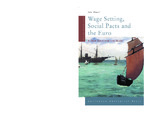Wage Setting, Social Pacts and the Euro
A New Role for the State
Abstract
Globalization, financial liberalization and neo-liberal economic policy thinking have been seen as contributors to the demise of social partnership in Western Europe. Recent examples of the re-emergence of social pacts have challenged these assumptions. The book offers a theoretical understanding of the challenges that increasing monetary integration posed for existing modes of adjustment in the political economies of EU member states, and explains why many governments have chosen to negotiate with trade unions over economic adjustment. Door de Europese monetaire integratie staan overheden voor een enorme economisch-politieke uitdaging. Niet langer kunnen ze door middel van waarde-inflatie de economische tekorten oplossen. Het gevolg was dat de Eurolanden loonbepalingen gebruiken om de economie bij te sturen. Opmerkelijk is dat in tegenstelling tot de wijdverbreide verwachting, loonbepalingssystemen in West-Europa de laatste 25 jaar gecentraliseerd zijn gebleven. En de band tussen overheden en sociale partners zijn eerder inniger dan losser geworden. Hassel onderzoekt in Wage Setting, Social Pacts and the Euro. A New Role for the State loonbepalingssystemen in West-Europa. Ze laat zien dat overheden hebben gekozen voor onderhandelingen met de sociale partners en niet voor de deregulering van de arbeidsmarkten. Hassel brengt de economische en politieke voordelen van de onderhandelde loonbepalingen naar voren, tegen de achtergrond van een strikter monetair beleid en een toegenomen economische openheid
Keywords
politicologie; political scienceDOI
10.5117/9789053569191Publisher
Amsterdam University PressPublisher website
https://www.aup.nl/Publication date and place
2006Series
Changing Welfare States,Classification
Politics and government


 Download
Download